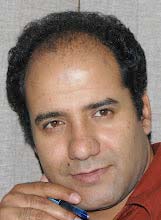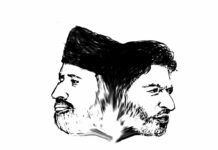Riyaz Masroor
 Kashmir has come a long way from 1950s and 60s. Back then, the individuals like Sheikh Abdullah and Bakhshi Ghulam Muhammad would set the political ideas. Now, it is the idea that shapes the individual noises. Earlier the love or hate for India would make for the key political content. Now, the political discourse primarily moves around two ideas: “Complete end to India’s military hold over J&K” and “the negotiated settlement”.
Kashmir has come a long way from 1950s and 60s. Back then, the individuals like Sheikh Abdullah and Bakhshi Ghulam Muhammad would set the political ideas. Now, it is the idea that shapes the individual noises. Earlier the love or hate for India would make for the key political content. Now, the political discourse primarily moves around two ideas: “Complete end to India’s military hold over J&K” and “the negotiated settlement”.
Syed Ali Geelani espouses the “Go India Politics”. On the other hand are his old and new colleagues, most notably Farooq Abdullah, Mufti Muhammad Syed, Mirwaiz Umar and Yasin Malik. A strong overlap is visible between the non-Geelani Azadi camp and the leagues of Abdullahs and Muftis. While Mirwaiz and Yasin Malik seek resolution of Kashmir issue, NC and PDP reiterate the demand with added rhetoric. While Hurriyat’s doves vie with each other for a seat on the dialogue table between India and Pakistan, NC and PDP blame each other for sabotaging the resolution or the processes of the resolution of Kashmir. But it is Geelani who relieves or upsets the embattled political actors. Many here believe that India and Pakistan nowadays judge Kashmiri politicians according to their distance from or proximity with this lone hawk Hurriyat (G).
Geelani who turned 84 in September 2013, seems lone ranger amidst Kashmir’s fast changing separatist polity. He still speaks the language that is now considered unpopular at the Capitol Hill, New Delhi or in Pakistan’s foreign policy chambers. Yet, he has grown into a vital reference point in the chronically divided politics of Jammu and Kashmir.
So, let’s admit ‘Geelanism’ exists and may stir up fierce ideological contests with the soft separatists and also between them. The soft separatism has already blurred the borders between the voices inside or outside the Kashmir’s 87-member legislative assembly. Human rights now form the mainstay of assembly debates. National Conference members while cornering PDP regime during 2004 termed civilian killings as ‘genocide’. The PDP in its turn as opposition in 2008 dubbed its 21 elected members as ‘Mujahideen’.
Whether Geelani’s shrill calls for boycotting elections succeeds or falls through as usual is beside the point. This battle of ideas (the old congress hand Mufti Syed claims to have waged this battle) could usher in paradoxical changes. Geelanism, for example, may trigger a latent unity among differing actors. We might soon hear NC, PDP, Hurriyat and JKLF raising pitch for water resources, jobs, economic exploitation, financial coercion in the form of taxes, corruption, poor governance and communal nepotism etc.
Then there is the Indo-Pak context. Ever since 1947, India and Pakistan have been pumping in resources to own up Kashmir. But after decades of wars and subterfuge, both India and Pakistan find themselves helpless in their ‘management’ of Kashmir. Despite military successes in 1947 and 1965, Indian rule could not gain enough social sanctity and political legitimacy in Kashmir. Similarly, Pakistan’s miscalculated moves with Kashmir have distanced people from the erstwhile pro-Pakistan fever. The crux is that both New Delhi and Islamabad have been betrayed or at least misled by their respective advocates.
It may be sheer luck of freedom camp or ‘mis-advocacy’ that India failed to convert her military constituency into a political one and Pakistan could not transform her emotional constituency into a concrete political space. If both countries make genuine peace, their errand boys may lose job.
Kashmir of 2014, therefore, may throw up an interesting scenario. We may witness a strong overlap between most of Azadi camp and the ruling elite. And, perhaps, zero space for pro-India or pro-Pakistan politics.















